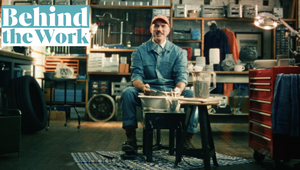
Production Line: From Both Sides of the Fence with Innocean’s Fabian Barz

Fabian Barz was born in West Berlin but grew up in Ibiza. He returned to his native city to study at the Art University and started his global advertising career at Markenfilm, TBWA\Berlin, Barcelona & Atletico, Amsterdam & Cayenne before returning back to Berlin to work at Wanda and Tony Petersen Film. He has been at Innocean Berlin for two years where he is the head of production.
LBB> What lasting impact has the experience of the pandemic had on how you and your agency think about and approach production?
Fabian> It's far too early to analyse what kind of lasting impact the pandemic will have. A lot has been done differently on the production side and I'm sure some things will not be turned back in the future when the pandemic is over. It is a shame how video calls before travel bans and home working, weren’t as accepted as they are now. Everyone has learned how to work technology and adapt to conference calls so I'm sure that we will have less business trips than before the pandemic.
Talking to production companies I’ve also learned that suddenly clients have more budget than we initially thought for rescheduling, cancellation fees or relocating the shoot in other countries. Production budgets have been quite healthy in the last 14 months so it would be great if it could remain at this level.
But other things need to go back to how it was before. Timings for example, which are binding and not as flexible as we’ve had to be during the pandemic. That has been tricky to manage.
Another big issue was the need to join milestone meetings remotely. We’ve had some situations where a lot of information has gotten lost during the production process because of not having all parties sitting in one room at one table. Before the pandemic I was a big fan of participants attending certain production appointments in person like the film shoot, the offline approval and the online approval and now, after doing so much remotely, I became an even bigger fan of this approach.
There is however, one project we produced during the pandemic that will always stay in my mind as a very positive experience. During last summer one of the very few places we were allowed to shoot a big car commercial was Berlin! We had this huge briefing for the eSUV fleet of Hyundai to be aired in fall last year. From the beginning of this project and in order to not get surprised by a second Covid wave, we decided, with the client, to immediately look only into shooting this in Berlin. Normally this would be considered a very unusual proposition to shoot German projects here as there are just so many options worldwide with cheaper ways to produce. So it was an incredible experience to produce a big car commercial here at home with our great local crew. One to remember for sure.
LBB> Aside from Covid-19, what have been the most disruptive forces to hit agency production in the past few years?
Fabian> I think the budget cuts over the last 10 years for productions have had a massive impact on our industry. I do think that there was a time when budgets were exaggerated and did not reflect the production values of the outcome of the production. But the budget cuts have reached a level that made it hard for production companies to deliver a comfortable production set up.
Please don’t get me wrong: there is still great creativity out there for a minimal budget. Our campaign for FAB (Animation Film Festival Berlin) is a perfect example for this. But the problem is that some clients are still demanding the same big campaign approaches as they have been produced in the last 20 years but with a heavily reduced budget.

LBB> A good producer should be able to produce for any medium, from film to events to digital. Do you agree or disagree with this statement?
Fabian> I agree 100%. Before joining this great team at Innocean Berlin, I was working on the production side. What I always loved about producing was the fact that no matter how much experience you had, there was something new that you had to learn in order to get the job properly done. Many times these were technical issues but also simple things like how to get a person out of a big birthday cake. Being a producer means getting things done. So yes, a good advertising producer should be able to organise and get the job done.
LBB> And leading on from that, when it comes to building up your team at the agency, what’s your view on the balance of specialists vs generalists?
Fabian> The amount of digital content in campaigns that we are developing is rapidly increasing. Currently we are looking for a specialist producer with a digital background. But I’m not contradicting what I have said before. We are doing this as we think someone with a digital background will be able to hook us up with new and interesting business partners as well as being up-to-date with anything that pops up in the world of digital content.
LBB> What’s your own pathway to production? When you started out, what sort of work were you producing and what lessons have stayed with you in that time?
Fabian> During my studies at the Art University in Berlin, I worked for a variety of TV shows. Here, I learned how important it is to do good research for every project that you produce. At that time, we did our whole research and our pre-prod planning on the phone, finding the best approach to each project. When I started at the advertising film company Markenfilm as a line producer this really helped me a lot. Remember there was still no internet at this stage so we spent hours carrying out research on the phone especially on finding the right locations for each production. Actually, on my first projects I did all the location scouting for the films that I produced as a line producer.
Today, when working with younger colleagues, I sometimes wish that we could get back to having more phone calls on the production side. You can react faster on information updates during a call instead of playing relentless ping pong with e-mails. And on the other side younger colleagues would learn much more from listening to the experienced producers solving production related topics on the phone.
LBB> If you compare your role to the role of the heads of TV/heads of production when you first joined the industry, what do you think are the most striking or interesting changes?
Fabian> I guess the job spec of a head of production today is the fact that the scope of work from our departments is now much more varied. Previously, the job was about doing TV, cinema or radio ads. Funnily enough the job title in Germany of a TV producer was: FFF-Producer or rather: Film, funk und fernsehen [television]. Today, we produce ads with production companies, have in-house post production, produce our own content, cover all kinds of additional content and are involved much earlier in the development of ad campaigns. And one thing that has not changed: the production department is still always the last one to leave the office and turn the lights off.
LBB> There are so many models for the way production is organised in the advertising industry - what set-ups have you found to be the most successful and why?
Fabian> It’s simple really, for us agency producers the most important tool and the basis of a successful production, is a very detailed briefing for the production companies when inviting them to the bidding process. This is what creates a very smooth process and everyone is on board with what needs to be done.
LBB> When working with a new partner or collaborator, how do you go about establishing trust?
Fabian> I think the essential tool for a good collaboration is an honest and well prepared pitch. In the pitch, the agency has a duty to inform their partner in detail about all expectations and the pitch attendees should be very detailed in their offer so it’s clear from the off. If both parties do well in this phase, then this is a good structure for a trusting partnership during a production, able to handle all the ups and downs that may come along until the delivery of the final master.
LBB> When it comes to educating producers how does your agency like to approach this?
Fabian> The last few years in Germany, we have been talking about establishing a course at film schools for agency producers. We have got very well trained production producers already coming from there so why shouldn't we also teach and train our agency producers there? I think this would be a very good step in the right direction.
LBB> What new skills have you had to add to the team as a result of the pandemic?
Fabian> We have all become experts in the legal aspect of the cancellation of projects and the possible cancellation fees involved. I assume that we have spent an average of five to six hours on each project sorting out with the client, the production and our internee how to handle the different Covid-19 cancelation scenarios.
LBB> Clients’ thirst for content seems to be unquenchable - and they need content that’s fast and responsive! What’s the key to creating LOTS of stuff at SPEED - without sacrificing production values? Is it even possible?
Fabian> Sure it's possible! The key is a very slim and flexible chain of command on the one side and a trusting relationship between client, agency and the team that executes the production of the idea on the other side.
LBB> To what extent is production strategic - traditionally it’s the part that comes at the ‘end’ of the agency process, but it seems in many cases production is a valuable voice to have right up top - what are your thoughts/experiences of this?
Fabian> As previously mentioned, I come from the production side and I had a few projects on the go where I had to ask myself how it could be possible for a deck/idea to come that far without anyone noticing that it actually cannot be produced that way?
Involving producers at an early stage of the development of a campaign can help to navigate the project from a production point of view and steer it into a right and realistic direction.
Apart from this, it also makes sense to align the creative approach of a campaign to the available budget and – one of the biggest problems especially in Germany – to the available timing for the production of a concept/campaign.
LBB> What’s the most exciting thing about working in production right now?
Fabian> The most exciting thing about our job in the production department at agencies is the huge amount of new technologies that are popping up and giving us so many possibilities to create content. In the past our job was to produce a well told story in 30 to 60 seconds. Now we have so many more tools for taking the customer on a communication experience far beyond a TV ad on the telly.
LBB> And what advice would you give to an aspiring agency producer?
Fabian> It is always very helpful for an agency producer to have some experience on the production side. The same as it is helpful for a production producer to have spent some time on the agency side. This way it's easier to come from a place of understanding and means there will (hopefully) be less friction along the way creating a brilliant and seamless shoot.















